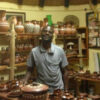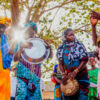The Shewula Mountain Camp was created in the Shewula community of Eswatini in 2000 and aims to allow tourists to discover the way of life of the community while helping it to develop and improve sustainably. It is an accommodation project that makes it possible for guests to live with a local population and experience their daily life.
“This is what ecotourism should be like when it’s not just a marketing ploy by private investors trying to exploit travellers’ good intentions”83

- This project was initiated by the community itself, with the help of the management of a local park, the Lubombo conservancy.
- Many activities are offered for guests to learn more about the intangible heritage of the community (including traditional healer visits, traditional song and dance performances, cultural walks, craft centre programme).84
- The camp is owned and run by the community and the benefits are invested back into the life of the community.
- It creates economic opportunities for locals (job offers in the camp, in the craft centre, in the Orphan Care Programme and agricultural initiatives for the camp’s catering).
- The project respects environmental sustainability objectives such as efficient water management.

- Some forms of ICH in this community are now actively performed and shared for tourists. This raises some questions. How did the ICH itself continue to be practised in the meantime? Are these still being practised with and for locals as well?

Collaboration: There is a strong relationship between the community (who takes care of the camp on a daily basis), the Lubombo conservancy and the Peace Parks Foundation (who supported the project). They also had financial help and technical assistance from international NGOs and governments (Italy and UK) for construction and building.
- 83 Shewula Mountain Camp tripadvisor. See Swaziland for real. Available at: https://www.tripadvisor.co.nz/ShowUserReviews-g1238216-d3479522-r167306155-Shewula_Mountain_Camp-Hlane_Royal_National_Park_Lubombo_District.html
- 84 Shewula Mountain Camp. Activities. Available at: http://www.shewulacamp.org/thecamp.php

















